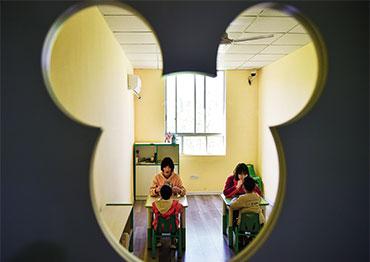According to an October 2021 report in The Lancet medical journal, no medications or therapies that use external devices are effective in treating autism, and all autism drugs are still in clinical trials.
However, over a dozen such treatments are available in China, from drugs and electro-therapies to stem cell transplants, Zou Xiaobing, director of the child behavioral center at Sun Yat-sen University’s Third Affiliated Hospital in Guangzhou, Guangdong Province, told NewsChina.
A search for “autism treatment” in any Chinese search engine produces pages of paid results from hospitals, many claiming to have cured hundreds of children with invasive treatments.
For example, a WeChat post from Nanhai Maternal and Child Care Center in November 2021 offered a surgical procedure they claimed could cure children with cerebral palsy or autism. However, the hospital refused NewsChina’s interview request, saying that not enough children have undergone the treatment.
Similarly, Guangdong Sanjiu Brain Hospital advertised surgeries for children with “mental retardation” on its website. They also refused to speak with NewsChina.
“I don’t condone autistic children undergoing these types of surgery. They are not based in theory or evidence-based medicine,” Zou Xiaobing said.
Other improper interventions can be equally dangerous. In 2016, 4-year-old Jia Jia suddenly died at a rehabilitation center for children with special needs in Guangzhou. As part of the therapy, Jia Jia was forced to run 19 kilometers while wearing a jacket in the summer heat, media reported. An autopsy revealed Jia Jia had died from pulmonary hemorrhaging and encephalitis.
His mother Zhang Wei told media she read about the center, Heaven’s Way, in a book written by its founder Xia Dejun. A self-taught health practitioner, Xia blamed parents for autism, calling it a disease of “spoiled, rich and lazy children.”
During an initial consultation, the center claimed Xia’s treatment, a hodge-podge of traditional Chinese medicine and strenuous physical exercise, had cured autistic children as young as 2 years old. Jia Jia’s parents paid more than 30,000 yuan (US$4,615) for three months of therapy.
Xia was put under investigation and the center eventually closed. Local commerce authorities told media it was registered as a “nutrition and health consultation company.”
A specialist in child autism who requested anonymity told NewsChina that for many institutions, autism is a cash cow. If established treatments like behavioral therapy are ineffective, they tell parents that their child is a severe case and offer more radical methods. If there is improvement, whether through behavioral therapy or natural physical development, they attribute the success to their treatment.
“Everyone claims to be an expert and parents never know who to trust. If they miss the window for behavioral therapy, it may be increasingly difficult for children to make progress through such treatment, as its efficacy decreases with age,” he said.
Even public hospitals are guilty of using scare tactics with parents. Liu Min told NewsChina that when she decided to opt for behavioral intervention elsewhere instead of the hospital-prescribed regimen of acupuncture, her doctor criticized her for abandoning treatment. Liu said she is still upset about the exchange. “I think many parents of newly diagnosed children have been intimidated by talk like that,” she said.
Chen Li complained the ward treating Lin Lin prescribes the same treatments for all patients – including acupuncture. She said many of the children appear fatigued and stressed from enduring the painful treatments.
Zhong Qing, a mother in Foshan, Guangdong Province, told NewsChina that a doctor prescribed a medicine cabinet full of expensive “brain supplements” for her autistic son Tong Tong that ultimately did nothing. She said many parents are burning through their savings on unnecessary medicines.
“Even if you give away everything you have to get your child treatment, you’ll probably end up worse off than when you started,” Zhong said. “Since so many parents have said that behavioral therapy is a long-term thing, just keep doing it. When you’re willing to accept your child’s condition, you’ll be able to see many things very clearly.”

 Old Version
Old Version

